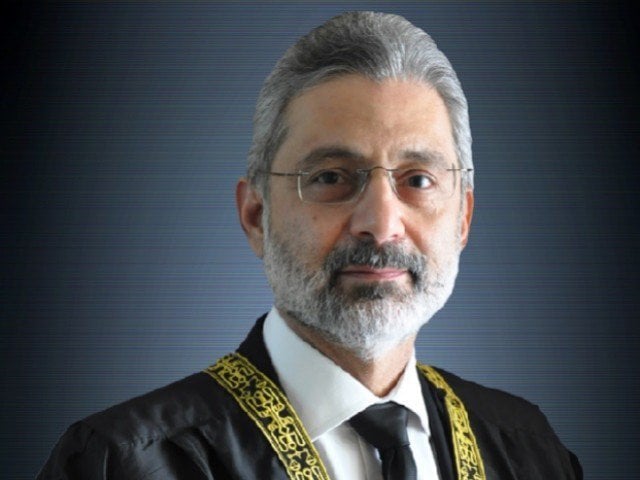
The constitutional petition was filed by the SCBA on Thursday through its president, Amanullah Kanrani, and the respondents are the Supreme Judicial Council (SJC), the president of Pakistan (through the principal secretary to the president), and the federation of Pakistan (through the secretary of law and justice division).
The petitioner contends that the references against Justice Isa "while cloaked in pious proclamations of accountability - are actually rooted in mala fides of fact and law."
"[The references] in fact, are an outcome of a joint and systematic attempt being made by certain visible, and certain invisible, quarters within the executive branch to intimidate judges into subjugation and permanently fetter the independence of the judiciary," states the petition.
Justice Qazi Faez Isa's differences with judges
The petition states that the "references are primarily motivated by his [Justice Isa's] authorship of the Faizabad judgment which have (sic) aroused great resentment on part of the ruling parties and within the visible and invisible branches of the government.”
It further states that "the petitioner was also aggrieved by the manner in which the said References are being proceeded with and by the general lack of transparency in proceedings before the Supreme Judicial Council."
The SCBA petition requests the SC to "declare that Special Reference No.1 of 2019 and Reference No.427 of 2019 are filed for collateral purposes and mala fide in law and fact and without legal basis and hence non est."
It also calls for the SJC to be restrained from proceeding further in the references and for all current proceedings to be declared "void, discriminatory and corum non judice".
The bar association has also sought SC directives to the SJC "to amend the SJC Procedure of Enquiry to provide greater transparency in the working of the SJC".
The petition is based on several grounds, some of which are as follows:
“That the references or complaints against Justice Isa have been preferred for collateral purposes and are mala fide in law and/or in fact and are non-est.”
“That the said references are primarily motivated by his authorship of the Faizabad judgment which have (sic) aroused great resentment on part of the ruling parties and within the visible and invisible branches of the government.”
“That as per Article-209 as interpreted by a 13-member bench of the Supreme Court in PLD 2010 SC 61, the complaint which culminated in the First Reference was required to be laid before the prime minister and president and no collection of any information regarding Justice Isa’s alleged misconduct could be initiated without their prior written approval. That the First Reference is, accordingly, based on mala fides of law and is a nullity.”
“That the so-called complaint and information against Justice Isa could only have been the result of covert and unauthorised surveillance or investigation. That allowing state agencies and functionaries to covertly surveil and investigate superior court judges and their families (without the aforesaid approval) amounts to granting them a license to blackmail and pressurise judges and is disastrous to the independence of [the] judiciary.”
“That the assets recovery unit and its chairman have no legal status and authority to initiate [an] investigation and direct state agencies like the FIA or FBR to share confidential data regarding any person (let alone superior court judges).”
“That the president and prime minister under Article-209 did not form their own objective and bona fide opinion that an act of misconduct was ostensibly committed before sending the First Reference and their failure to do so renders the same non-est.”
“That section-116 of the Income Tax Ordinance does not require a person to declare the assets of his wife and children unless the same are in fact his own assets purchased through his own funds and merely being held benami [anonymous] in their name.”
"That the alleged failure of Justice Isa’s wife and/or children to declare certain properties in their wealth statement could not give rise (without further evidence) to a presumption that they were held benami for Justice Isa and that he was breaching any laws relating money laundering and foreign exchange regimes. That the allegations in respect of the latter were, in any event, too vague to form the basis of a Reference."
"That as per our laws and religion, a man’s adult wife and children are not mere extensions of his. He is not personally answerable and liable for any act or omission on their part nor to account for any asset they may own."
“That a judge and his family are equally entitled to due process of law under Article 10-A of the constitution including the benefit of the adjudication process prescribed under tax laws. As such, no Reference was preferable until the same had been concluded and a finding, if any, against Justice Isa made.”
Read: Faizabad sit-in case full judgement
"That the selective leaking of contents of a Presidential Reference against a judge by the referring authorities (or their subordinates) is demonstrative of malice and renders the same liable to quashment."
"That neither the AG nor the SJC possessed any power to enlarge the scope of inquiry being carried out pursuant to a Presidential Reference to matters beyond the allegations in the Reference itself."
"That the SJC’s consideration of additional facts and documents alien to the Presidential Reference while deciding to issue show cause notice and without allowing Justice Isa an opportunity of objection amounts to a breach of Article 209 and Article 10-A of the Constitution and renders the proceedings corum non judice."
"That a show-cause notice issued to a Judge pursuant to a Presidential Reference cannot travel beyond the Reference itself and even beyond the orders of the SJC. As such, a show-cause notice containing material not forming part of the Presidential Reference and/or the SJC order is patently mala fide in law and fact, without jurisdiction and any proceedings pursuant thereto corum non judice."
"That the President of Pakistan is the Head of State and of all its various organs besides being the appointing, referring and removing authority in respect of superior court judges. As such, the act of writing a letter to the President of Pakistan (whether privately or publicly) on part of a Supreme Court judge cannot amount to misconduct in terms of Article 209 of the Constitution."
"That the issuance of show cause notice for writing a letter to the President of Pakistan undermines the autonomy of individual Supreme Court judges who are all equal (with the Chief Justice only being first amongst equals) and relegates them to the status of government servants of subordinate rank in a departmental hierarchy. A superior court judge is not bound by rules applicable to government servants regarding official communications."
"That a Chief Justice is required to properly guide and advise his fellow judges in questions relating to the propriety of any act. As such, a judge cannot be penalized if he exercises his discretion in a matter of propriety after consultation with the Chief Justice."
"That the Code of Conduct cannot be interpreted in a manner so as to completely curtail the rights of a judge under Article 19 and 19-A of the Constitution. A balance must be drawn in keeping with modern trends and global practices."
"That Para 7 of the SJC Procedure of Inquiry 2005 is an essential precursor to the engagement of Paras 8 and 9 and, hence, without the opinion of the referee judge as to the sufficiency of material in the complaint/information to establish prima facie guilt, the SJC could not have proceeded with the Second Reference."
"That the SJC must be objectively satisfied that any complaint/information before it successfully makes out an ostensible case of misconduct prior to issuing a show-cause notice thereon. No such objective satisfaction could have existed in either Reference."
"That the independence of judges must be protected not only from any possible encroachment from the executive but also from any possible encroachment by their peers and seniors including members of the SJC."
"That the non-transparency in the workings of the SJC is detrimental to the reputation, efficiency and independence of judiciary."
"That the discretion of the SJC regarding the order and pace with which to take up and process complaints/references must not be exercised arbitrarily and requires structuring. The manner in which the Reference against Justice Isa have been proceeded appears discriminatory and in violation of Article 25 of the Constitution and has created an impression of bias."
"That the pendency of a complaint/reference against an SJC member (which has passed the initial stage of scrutiny prescribed in Para 7 of the SJC Procedure of Inquiry) may be deemed as a sufficient “other cause” making him unable to act within the meaning of Article 209 (3) of the Constitution."
ISI challenges SC's Faizabad sit-in verdict
"That all of the above grounds are interlinked to the Fundamental Rights guaranteed under Article 9, 10-A and 25 of the Constitution and to the independence of judiciary guaranteed, inter alia, under Articles 4 and 175 of the Constitution."
"That it appears from the record that the show cause notice in the second case of addressing letter to the President was issued without following the process and procedure laid down under SJC Procedure of Inquiry 2005. There appears to be a clear violation of Paras 7, 8, 9 and other relevant Paras of the said Rules of 2005."
"That the learned Respondent Judge was entitled to due process within the meaning of Article 10A of the Constitution without being proceeded against under Section 116 and other relevant and concerned provisions of the income Tax Ordinance 2001 and providing full opportunity to the learned Respondent Judge to defend himself and avail remedies thereunder. It cannot be said that due process under the income Tax Laws was provided to the learned Respondent Judge."
"That without following such process, no fact alleged against the learned Respondent Judge regarding contravention of section 116 of the Income Tax Ordinance or any other provisions can either be alleged against the learned Respondent Judge or any proceedings in this behalf could have been undertaken against him on the basis of such allegations."
Faizabad verdict
Earlier this year, a two-member bench of the SC comprising Justice Qazi Faez Isa and Justice Mushir Alam issued a verdict in a suo motu case pertaining to the 2017 sit-in staged by the Tehreek-e-Labbaik Pakistan (TLP) at Faizabad Interchange in Islamabad.
In the verdict, authored by Justice Isa, the apex court directed the federal and provincial governments to monitor all elements “advocating hate, extremism and terrorism and prosecute the perpetrators in accordance with the law”.
The top court in its verdict had also directed the intelligence agencies, including the Inter-Services Intelligence (ISI), the Intelligence Bureau (IB) and the Military Intelligence (MI), and the Inter-Services Public Relations (ISPR), not to exceed their constitutional mandates.
The country’s premier intelligence agency ISI had later also challenged the SC’s Faizabad verdict, arguing it would adversely affect the morale of the armed forces.
1732503274-0/Untitled-design-(43)1732503274-0-405x300.webp)
1732501636-0/Untitled-design-(42)1732501636-0-165x106.webp)

1732498967-0/Outer-Banks--(1)1732498967-0-165x106.webp)
1732086766-0/BeFunky-collage-(74)1732086766-0-165x106.webp)












COMMENTS
Comments are moderated and generally will be posted if they are on-topic and not abusive.
For more information, please see our Comments FAQ